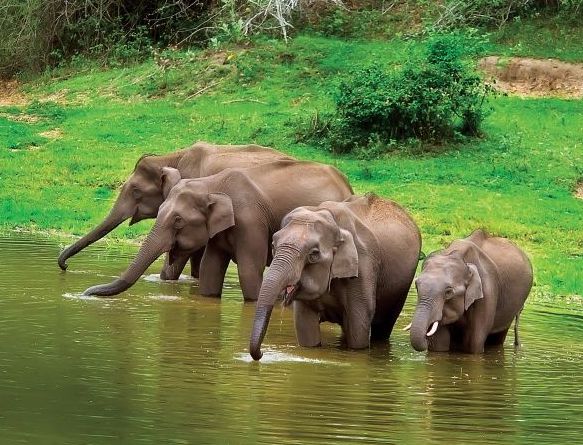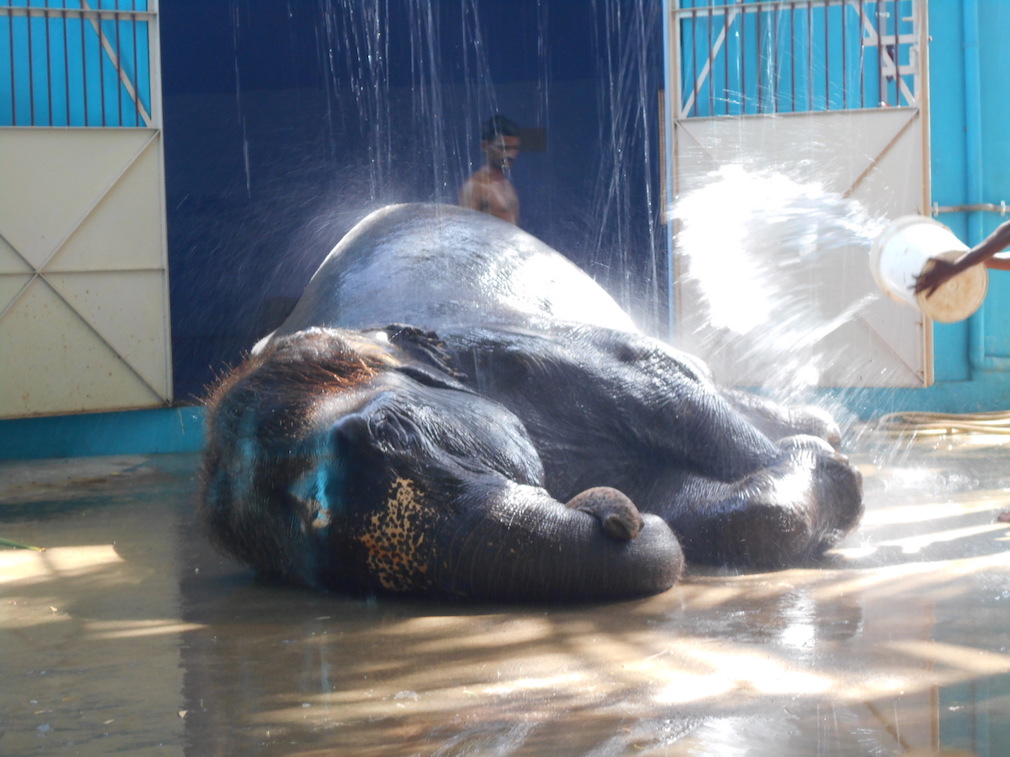
Human animal conflict Training for forest personnel
The proposed project is to conduct Human Elephant Conflict HEC capacity building training for forest frontline staff and Human Elephant Coexistence HECx sensitization programme for the media and other line department staff in the area covering Sathyamangalam Tiger Reserve STR including Erode Forest Division in the Eastern Ghats and recently declared (8 Feb 2021) India's 51 tiger reserve located on the Western Ghats Srivilliputhur-Megamalai Tiger Reserve SMTR in collaboration with Tamil Nadu Forest Department and other non-governmental organizations are working in the area. Funded by the Asian Elephant Conservation Fund, US Fish and Wildlife Service, USA.


Reviving and Strengthening Joint Forest Management for the promotion and livelihoods in SMTR, TN, India
The Srivilliputhur-Megamalai Tiger Reserve, the newly declared Tiger Reserve has many villages around the area. The purpose of this project is to involve the local people in the conservation of the habitat and biodiversity, by way of creating joint forest management committees, providing livelihood support programmes for the people, capacity-building programmes for the forest frontline staff, and conservation education by conducting trainers training programmes for educators. The main target group for this two-year project is 50+ village communities around the Tiger Reserve in Viruthunagar district and the forest personnel.


Inspiring Human Elephant Coexistence (HECx) among community through street theatre
The proposed project is to conduct Human Elephant Coexistence HECx street plays for villagers and school awareness programmes for school children in the Anamalai Tiger Reserve area of Coimbatore District, Tamil Nadu, India, in order to use the tools to promote understanding and improve their awareness and attitudes toward elephants in order to avoid confrontation and conflict whenever possible.


Hoolock Gibbon Conservation in the Protected Areas of Tripura and NE India
Hoolock Gibbon (Hoolock hoolock) is the only ape found in India and it has been assessed as Endangered in IUCN Red List. Hoolock Gibbon needs attention at several levels of people in order to their survival. ZOO’s Hoolock Gibbon PHVA held in 2005 made several recommendations on staff training and conservation education. ZOO instigated conservation activities for this species a long ago. In 2007 ZOO conducted conservation education workshops in Assam. This project extending the program to the other Northeast India state of Tripura. The primary goal is ensure long-term conservation of Hoolock Gibbon and its habitat by engendering well-trained, skilled and motivated frontline staff and conservation educators. The objectives are conducting capacity building trainings for forest frontline staff and teaching trainers program for the educators.


Project Kaliru
Targeting to achieve zero mortality in HEC areas in partnership with Tamil Nadu Forest department.
To educate stakeholders to modify livelihood / lifestyle methods that are incompatible in HEC areas and to educate local bodies in developing safety protocols in conflict areas
To plan and organize mass awareness programmes for the community in HECx in conflict prone areas of Coimbatore forest range
Evaluating the impact of the program


Prevention and Mitigation of Humans-Elephant Conflict in North Bengal
The project intend to provide dynamic training and supply relevant educational materials promoting Human-Elephant Coexistence (HECx) to a set of identified educators of different sectors, e.g., NGOs, forest and wildlife staff involved in education, volunteers, wildlife researchers, rural school and college teachers, and selected individuals who live and work in Human-Elephant Conflict areas of North Bengal. The primary objective of the workshop is to teach positive attitudes and effective preventative and practical behaviour concerning elephants and Human-elephant conflict. The secondary objective is to utilize the methods employed in the workshops to train teachers and other educators in teaching more meaningfully and effectively, combining active learning techniques.

Conservation Education and Capacity building for Tiger Conservation
Goal 1: Create awareness on tiger conservation through education and training Objectives: To train teacher educators to promote tiger conservation in Arunachal Pradesh Activity: Three-day teacher training workshop for Educators, forest personnel, NGOs and interested individuals will be conducted Goal 2: To build the capacity and to strengthen the management skills of forest front-line staff Objective: To update and provide up to date information on wildlife conservation management and tools Activity: 5-day capacity building training.


Prevention and Mitigation of Humans and Pachyderms Conflict in Nepal
The goal of the project is ‘Towards zero casualty of man and animal in human-elephant conflict areas and a community that appreciate and co-exist with elephants’. Major objectives of the project are: to reduce human-elephant conflict by conveying positive attitudes and effective preventative and practical behaviour; to reach out to wider target groups in three HEC areas and to create awareness about co-existence and; to evaluate the impacts of the project and to continue creating awareness even after project period. Ministry of Forest and Soil Conservation, Department of National Parks and Wildlife Conservation, Bardia National Park and National Trust for Nature Conservation and other NGOs will be the collaborators of the project coordinated by Zoo Outreach Organisation, India and with the financial support of USFWS.


Safe guarding the Greater One-horned Rhino meta-population
The objective of the project is to identify conservation educators in rhino range areas holding meta-populations in India (West Bengal and Uttar Pradesh), provide lively training and effective education materials on the Greater One-horned Rhino conservation to selected conservation educators ultimately reaching to wider communities who live in and around the Protected Areas (PAs). This is carried out based on the recommendations of Rhino specialists, that is to involve local community in rhino conservation, implementing education and awareness programmes and to reduce human-rhino conflicts so as to save the species from local extinction, subsequently a series of awareness programmes for the community.


Elephant conservation welfare training for temple mahouts
A study by Varman (2008) on the status of captive elephants in Tamil Nadu and other India states state recommended that those elephant handlers require training so as to improve the welfare of captive elephants. In Tamil Nadu the Hindu Religious and Charitable Endowments HR&CE Department conduct rejuvenation camps for temple elephants and private owned elephants too need them. This project is to conduct elephant welfare training programs for elephant handers namely mahout, cavadi, managers of private elephant owners who handle about 40 elephants in TN. Welfare of captive elephants can be developed through proper understanding of the basic biology, daily requirement, activities and behavior of the animal, proper handling, care, husbandry and humane treatment. ZOO in collaboration with HR&CE and Tamil Nadu Forest Department and industrialists is planning to have a training program in Southern Districts of TN. The project will develop a database of elephant handlers and captive elephant details that will form baseline information for future conservation initiatives.

Outreach/Awareness TrainingZOO’s specialty is zoo and conservation education. Over the years the organization has conducted over a hundred training courses in different states, countries as even continents and brought out many publications of packets, books, posters and other educational material. Exemplification of ZOO's educational practice. ZOO's Teaching materialsEducation Packets
Teaching Manuals
Posters
Colouring Books
ComicsAchamba booklet Foldouts
|
 
|
Education ProgrammesAmphibian Bat Bear Conservation Getting on with Elephants (Behaviour) Pangolin Rhino Tiger ZOO Education |

|
Donate to conserve
Support our conservation mission. Be a part of the movement to bring back species from the brink. Help our living planet remain healthy. Join in by donating to Zooreach.
Volunteer or Intern
The future of our living planet is in the hands of the youth to effect a change. Zooreach helps the young and young-minded with opportunities to help build a platform for saving species and habitats from going extinct. We transform the youth with innovations, training, skills and science to develop into a force for positive change to the environment as a whole and communities at risk.
Be a citizen scientist
You can be a scientist whether you are a student or a concerned citizen. You don't need a degree in any biological sciences to be a part of this quest to save our living world; all you need is to actually want to save it, a dash of interest, a sprinkle of curiosity, and the absolute will to make a difference. Join our citizen science programs.





